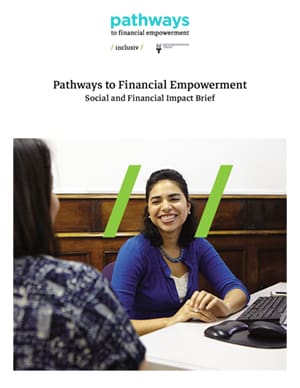58% of credit union members improved their credit score, according to new brief
NEW YORK (September 19, 2019) – Financial coaching has a positive impact on credit unions and their members, according to new brief by Inclusiv, a nonprofit dedicated to promoting financial inclusion in low-income communities through community development credit unions (CDCUs), and Neighborhood Trust Financial Partners, a national nonprofit financial counseling provider. The paper, “The Social and Financial Impact of Financial Counseling in Credit Unions,” published with support from MetLife Foundation, analyzes the social and financial impact of Pathways to Financial Empowerment (Pathways), the first outcome-tracking platform that leverages technology for the delivery of best-in-class financial coaching and counseling to improve the financial health of credit union members.
Through Pathways, credit union financial coaches learn to deliver best practice financial coaching and utilize the Pathways impact-tracking platform to measure members’ financial health progress. Launched in 2015, Pathways helps credit unions integrate financial coaching into their operations so products and services are delivered as part of a member’s holistic financial plan.
Inclusiv and Neighborhood Trust found that credit union members who participate in financial coaching gain access to affordable credit and products and improve their financial health. Additionally, financial coaching supports the financial health of credit unions, increasing the number of members who are eligible for financial products and demonstrating returns on investing in financial coaching as a service.
“Financial coaching in community development credit unions has long been an important tool in boosting financial health and wellbeing of underserved consumers,” said Cathie Mahon, President/CEO, Inclusiv. “This report demonstrates tangible benefits of this approach for the credit union as well.”
“Trusted human guidance should be an essential feature of financial services, especially for low-to-moderate-income consumers who are unfamiliar with or mistrusting of the financial services system,” said Justine Zinkin, CEO, Neighborhood Trust Financial Partners. “Every day we see that when you give someone individual attention to build a plan, they are more likely to use products that matter to them. Pathways proves that financial coaching can help people leverage products as part of a holistic financial plan to achieve their goals and is smart business.”
“We’ve seen that financial coaching, when delivered at the right time and with the right products, is an effective strategy in building financial health for low-income individuals,” said Evelyn Stark, Financial Health Lead for MetLife Foundation. “Clients are helping themselves, with their financial coach pointing them in the right direction to make small changes in their financial behavior that result in quick successes — like lower debt and increased savings. We’re hopeful that the lessons we learned through the Pathways program will help even more credit unions adopt financial coaching as a way to better serve their low-income clients.”
Of clients who participated in Pathways financial coaching:
- 58% improved their credit score, with an average improvement of 38 points, six-to-12 months after an initial coaching session.
- Nearly one in five subprime clients improved their credit score enough to rise above the 620 threshold, significantly expanding their access to affordable products. Among this group, the average score increase was a dramatic 66 points.
- Roughly 10% opened new savings accounts at their credit unions (including CDs, money market, etc.) totaling $740,084, which is especially impressive considering their median income is only $26,000.
- Through first quarter of 2019, clients have already taken out over 3,000 new loans—totaling nearly $22 million—at credit unions, including small-dollar personal loans, credit builder loans, auto loans, credit cards and home equity loans.
- Clients who have taken out small-dollar personal loans are saving anywhere from 100% to 600% in interest when compared to a typical payday loan and are successful in those loans with a delinquency rate of just 3%, lower than the US personal loan delinquency rate for all credit tiers of 3.6% and half of the 6% average default rate for payday loans.
- Auto borrowers have saved $525,000 in interest at an average of nearly $1,000 per person.
As for the credit unions participating in Pathways, Inclusiv and Neighborhood Trust’s analysis found that credit unions could offset the costs of maintaining a financial coaching program in several ways:
- Generating revenue by growing responsible lending to borrowers with subprime credit scores, people who would have been rejected for loans and gone elsewhere if not for financial coaching;
- Mitigating the risk of losses by providing financial coaching to borrowers who might have otherwise defaulted; and
- Raising additional revenue from new products informed by financial coaching and that better meet the needs of their membership.

Read Pathways to Financial Empowerment report:
Social and Financial Impact Brief
About Inclusiv
At Inclusiv, we believe that true financial inclusion and empowerment is a fundamental right. We dedicate ourselves to closing the gaps and removing barriers to financial opportunities for people living in distressed and underserved communities. Inclusiv is a certified CDFI intermediary that transforms local progress into lasting national change. We provide capital, make connections, build capacity, develop innovative products and services and advocate for our member community development credit unions (CDCUs). Inclusiv members serve over 9.7 million residents of low-income urban, rural and reservation-based communities across the US and hold over $99 billion in community-controlled assets. Founded in 1974, Inclusiv is headquartered in New York, NY, with offices in Madison, WI and Atlanta, GA. For more information about Inclusiv visit us at www.inclusiv.org.
About Neighborhood Trust Financial Partners
Neighborhood Trust is a nonprofit social enterprise empowering workers to take control of their finances and achieve financial health. With more than 20 years of financial counseling experience, we blend our trusted financial guidance with innovative technology solutions and actionable financial products to help workers’ paychecks go further. Neighborhood Trust embeds our services where workers get paid, access financial services and make financial decisions. Annually we reach more than 10,000 low- and moderate-income workers across the country. For more information, visit www.neighborhoodtrust.org.
About MetLife Foundation
At MetLife Foundation, we believe financial health belongs to everyone. We bring together bold solutions, deep financial expertise and meaningful grants to build financial health for people and communities that are underserved and aspire for more. We partner with organizations around the world to create financial health solutions and build stronger communities, engaging MetLife employee volunteers to help drive impact. To date, our financial health work has reached 9.9 million low-income individuals in 42 countries. To learn more about MetLife Foundation, visit metlife.org.




Follow Us